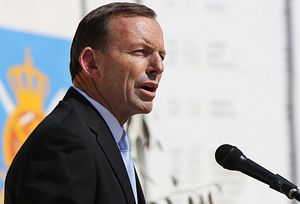Australian Prime Minister Tony Abbott has been slammed in the opinion polls a week after handing down the government’s first budget since taking office last year.
The public were quick to turn on Abbott and his conservative Liberal Party after the most unpopular budget in nearly two decades, which contained a slew of broken election promises with cuts to welfare, education, health and pensions along with increased new taxes.
Polling done by Fairfax media and Nielson this week showed Abbott’s approval rating dropping by 9 points, to 34 percent. On a two-party preferred basis the Liberals fell to 44 percent, against the opposition Labor Party’s 56 percent.
The government had always warned that the budget was going to be a harsh one. Treasurer Joe Hockey said on Monday that while it may not be a popular budget it was, “The right one for Australia.”
“We didn’t go through … all the dark days of opposition to get back into government and do the things that might please people, that might sound easy on the ear,” Hockey said.
Being the first budget since the government has come to office the Liberals have portrayed themselves as cleaning up the national “budget emergency” left by the previous Labor government.
Treasury has forecast an A$29.8 billion ($27.6 billion) deficit for the 12 months through till June 2015. This is down from A$49.9 billion deficit this fiscal year, with estimates showing the country on track for a surplus of, “Well over 1% of GDP,” by 2024-2025.
But while the need for strict fiscal management was understood by the public it is the fairness of the budget that has angered many voters, with 63 percent of poll respondents this week saying that the budget cuts did not affect all Australians fairly.
Highlighting how the budget will hit the poor hardest, Australian National University has calculated that a single-parent with one-child on government payments would be more than 10.2 percent worse off because of the budget measures. An unemployed 23 year old would lose 18.3 percent of their income, while high-income earners earning $250,000 a year would lose less than 1 percent of theirs.
The budget features A$80 billion in cuts to public health and education, a new fee for low-income earners to visit the doctors (effectively scrapping Australia’s free universal healthcare), along with a range of cuts to welfare with the pension age also to rise to 70 by 2035.
Some areas such as paid parental leave have seen an increase, while new money has also been promised for medical research along with an increase of more than 6 percent in real terms in military expenditure.
Tens of thousands of people took to the streets in major cities across Australia over the weekend to protest the budget cuts. However it is the Senate, where the government doesn’t have a majority, that may have the last say, with minor parties threatening to side with the Opposition in blocking some of the unpopular budget measures.
With more than two and a half years until the next federal election Abbott has taken a gamble that the wave of public anger will pass. Harsh measures now will give the government scope for softer budgets throughout the rest of its term. In the meantime, the Liberals are firmly painting themselves as a government that will be fiscally responsible…whether the public likes it or not.

































